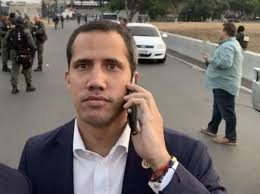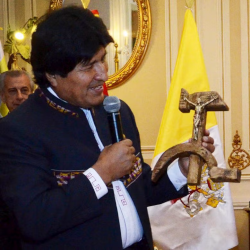The 1970 presidential elections were contested by the conservative Misael Pastrana Borrero and General Gustavo Rojas Pinilla, leader of the Alianza Nacional Popular (National Popular Alliance), a motley organization, with liberals, conservatives and military men in line with Latin American progressive movements.
The elections were held on April 19 of that year. According to the afternoon radio transmissions, the general seemed to have the majority of votes; however, in the evening the Minister of Government, Carlos Augusto Noriega, suspended the information of the contest. A state of siege was declared. President Carlos Lleras pronounced his famous "clock speech", with which he announced the curfew and the obligation of all Colombians to go to sleep.
The results came in dribs and drabs, the anxiety of Colombians increased, since for many it was the opportunity to put an end to the National Front which, for many sectors, was considered as a pact of elites. Finally, the victory of Pastrana Borrero was proclaimed.
The suspicion of fraud was inevitable. There were demonstrations, but General Rojas did not fight to vindicate his victory. Minister Noriega, nicknamed 'El Tigrillo', confirmed the suspicions in his book 'Fraude en la Elección de Pastrana Borrero', published in 1992.
Shortly after the elections, some curious notices appeared in the press and on the walls of some cities that seemed to promote medicinal restorative: "Lack of energy, parasites? wait M-19" or "Lack of energy. Inactivity? Wait for M-19". And in January 1974, the group's first action took place, with the theft of the Liberator's sword in the Quinta de Bolivar. From then on, the M-19 presented itself as an urban, nationalist, anti-imperialist and anti-oligarchic political-military organization.
Its leaders came from the left wing of Anapo, as well as sympathizers of the Golconda religious group and disenchanted members of the FARC and the Communist Party. Some of them were Carlos Pizarro Leongómez, son of an admiral; Jaime Bateman; Everth Bustamante, Andrés Almarales and Carlos Toledo Plata.
According to their manifestos, they wanted to achieve a truly participatory democracy, without Marxist reference, unlike the Farc, the Eln and the Epl. They were joined by sectors of the middle class and the working class, whom this organization supported in their struggles. Through their communications agency 'Oiga Hermano' they disseminated bulletins and communiqués, and at the same time they were close to the magazine Alternativa, a publication of investigative journalism.
The actions of the M-19 materialized in operations of great public impact, such as the theft of Bolivar's sword (1974), the theft of at least 5,000 weapons from Cantón Norte (January 1, 1979), and the seizure of the Embassy of the Dominican Republic (1980), on a day when several ambassadors were meeting, including that of the United States. The seizure lasted two months and aroused the interest and curiosity of the people of Bogota. It ended without bloodshed.
On the other hand, the seizure of the Palace of Justice in 1985, with the objective of bringing President Betancur to trial, turned into a tragedy with the retaking of the Palace by the Army, with a toll of 11 magistrates dead, several civilians, and missing persons, for a total of 94 dead. Other acts, such as the assassination of José Raquel Mercado, president of the trade union CTC, or the 53-day kidnapping of Álvaro Gómez Hurtado, were repudiated. At the same time, the robbery of trucks loaded with foodstuffs to distribute them in the neighborhoods was well regarded by popular sectors, although the last one, on September 30, 1985, ended in the death of the assailants.
The agreement implied the laying down of arms and the right to political participation of the demobilized combatants. This was how the idea of a National Constituent Assembly was conceived to create the Constitution that replaced the 1886 Constitution, opening politics to new political parties and movements. With the seventh ballot, a student initiative, the objective was achieved, and in the election of the members of the Constituent Assembly, the Democratic Alliance M-19 achieved a considerable vote.
the M-19 would eventually become another political party in colombia.
Announcements & Information
Megathreads and spaces to hang out:
- ❤️ Come listen to music with your fellow Hexbears in Cy.tube
- 💖 Come talk in the New weekly queer thread
- 🧡 Monthly Neurodiverse Megathread
- 💛 Read about a current topic in the news
- ⭐️ May Movie Schedule ⭐️
reminders:
- 💚 You nerds can join specific comms to see posts about all sorts of topics
- 💙 Hexbear’s algorithm prioritizes struggle sessions over upbears
- 💜 Sorting by new you nerd
- 🌈 If you ever want to make your own megathread, you can go here nerd
Links To Resources (Aid and Theory):
Aid:
- 💙Comprehensive list of resources for those in need of an abortion -- reddit link
- 💙Resources for Palestine
Theory:
Looks like Petro has won in colombia and he used to be a guerrillero of the M-19, also new megathread nerds :posting:
@aaaaaaadjsf @Abraxiel @AnarchaPrincess @Antilope @Alaskaball @BrookeBaybee @bbnh69420 @buh @CARCOSA @CDommunist @Cherufe @ClathrateG @ClimateChangeAnxiety @clover @comi @Commander_Data @COMMENT @ComradeCmdrPiggy @ComradeEchidna @context @congressbaseballfan @crime @Dirt_Owl @Donut @Eco @ella @el_principito @EmmaGoldman @FidelCashflow @Frogmanfromlake @GalaxyBrain @ghosts @Goadstool @GoroAkechi @Grownbravy @Ideology @JamesConeZone @Kanna @Kaputnik @kristina @Koa_lala @LeninWeave @LoudMuffin @Lundi @marxisthayaca @MaybeNickCage @MelaniaTrump @Mindfury @Ness @PM_ME_YOUR_FOUCAULTS @PorkrollPosadist @PootrKrobuttkin @PurrLure @Ram_The_Manparts @Redcuban1959 @REallyN @RNAi @RoseColoredVoid @Sandinband @SorosFootSoldier @Spike @TankieTanuki @Tervell @ThisMachinePostsHog @Trouble @ultraviolet @UlyssesT @viva_la_juche @WIIHAPPYFEW @Wmill @wtypstanaccount04 @Yanqui_UXO @Zoift
It's a great time to be alive cuz everything is shit and we got a lot of work to do.
Aight nerds, I'm mod in this mega so y'all better behave or face the chancla.
Cautiously happy for Colombia. We had a former guerrillero once and he ended up being a weak socdem. Wish the best for them in overcoming their struggles.
I have now been sober for 3 weeks, which is the longest streak I've had in about 9 months. I'll have to beat 2 months in order to take the second longest streak. The longest was one year. No more updates until I hit 30 days. Thanks for listening to my spiel.
I support sober streaking. You're less likely to fall and scrape something delicate that way.
How fucked up is our society where the advice for not going insane boils down to "Don't think"
:blob-no-thoughts: :grillman: :sit-back-and-enjoy: :sicko-wistful: :elmofire: :this-is-fine: :liberalism: :im-doing-my-part:
I saw my cop cousin for the first time in a few years. He’s getting married so our families are really trying to get us to talk even though there’s no way I’m going.
Me and a couple of family members met him at a public park he works private security at. I’m sitting here laughing at how much of a self righteous dork he is. He walks up to us with his in your face police jacket on and I asked “why are you wearing your cop jacket?” without even saying hello. We walk around the park and he’s saying “how you doing?” to every single person we walked past. These people are just trying to play baseball or enjoy the park, stop being so self important with your police jacket while working your private security side job.
I’ll also add he’s getting married to the police chief’s daughter who was the woman he slept with while dating someone for 7 years. The police chief’s daughter threw out all of the ex’s art while the cheating was occurring. I’m not celebrating a marriage between two hogs like that.
ups bout to strike. i was like 'hey you guys gonna strike?' and he smiled and gave me a thumbs up, and i smiled and gave them a thumbs up. we're going out on friday to get drunk and break windows.
alright the last line was a lie. :sadness:
It's my birthday today (yay me). Not really celebrating it, though. Only one of my friends messaged me to wish a happy birthday. And it's like a 'tradition' to gift a group gift when it's somebody's birthday. I always contributed to that for others. I got literally not even a message. I think I'm going to just fuck off.
I'm taking back the word 'gay'. It now means "thing that fucking slaps". New example uses:
- "Fuck yeah, that's gay as hell!"
- "Burning down police stations is the gayest, dude."
- "Did you see that they put Glup Shitto in the new Kenobi episode? This show is so straight."
One of the biggest obstacles to leftism becoming more popular is that people transitioning from liberalism to communism are really annoying for at least half a year. It's so hard to not bully them.
I mean, a huge number are vaushites and maupinites. They deserve to get bullied.
Didn't realise how straight up racist the bored ape NFTs were until now. Like, they always made me feel weird with it literally being ape charicatures, but it's literally just neo Nazi dog whisles left and right.
Didn't they put kamakazie imperial Japan headbands on them as well?
Seriously how'd they get shit like that mainstream and on people like Justin Bieber's IG?
The kamikaze headbands have been floating around in American pop culture since the 80s at least, almost entirely stripped of their context and meaning.
I get that to a point, but have these people/celeb PR teams never heard of simianization before? I remember some popular African American celebrities calling it out before being silenced by the NFT media marketing machine.
I'd find that to be a hard sell for the apes. With ten thousand of them randomly generated with markers of all kinds of sub-cultures and groups with varying degrees of associated social prestige, sometimes an ape is just and ape. I don't see an author's intent to mock black people by using cartoon chimpanzees, and I don't see any clear way to read it as having that as an unintended effect. The apes are supposed to be read as apes because monkeys are funny, and as far as I'm aware most of the audience reads the apes as apes, rather than any kind of allegory. Not saying the author's aren't chuds, because they pretty clearly are, but I don't think the use of cartoon apes is intended or understood to have that meaning.
I thought that too, but I read this and I've been convinced that it's just an avenue to get Nazi shit on the front page of everything.
When the neo Nazi cofounder of the bored ape stuff says that nothing is random in the collection and references iceberg theory, then yea...
https://gordongoner.com/
I'm not completely convinced, but I also acknowledge that Nazis love to hide and play in that kind of ambiguity. So I'm like 80% convinced.
Yeah, I know. I'm increasing convinced. It calls to mind the Sartre quote;
“Never believe that anti-Semites are completely unaware of the absurdity of their replies. They know that their remarks are frivolous, open to challenge. But they are amusing themselves, for it is their adversary who is obliged to use words responsibly, since he believes in words. The anti-Semites have the right to play. They even like to play with discourse for, by giving ridiculous reasons, they discredit the seriousness of their interlocutors. They delight in acting in bad faith, since they seek not to persuade by sound argument but to intimidate and disconcert. If you press them too closely, they will abruptly fall silent, loftily indicating by some phrase that the time for argument is past.”
Hachimakis don't even have the kamikaze connotation within Japan.
For sure, but it's quite mad how successful the whole thing was/is.
It's just unbelievable how they got this shit on the font page of everything. You have some of the most famous people in the world unknowingly shilling neo Nazi propaganda
Theyve been doing it for years and finally found a way to monetise it.
👌
Yeah the ok symbol was basically a trail run, convincing people it was a white supremacist symbol to the point actual white supremacists started using it. And then it became an unironic white supremacist thing.
Literally memed it into reality. They tried something similar with the "I like milk" stuff, thankfully that flopped
👌, drink milk & capture the flag with shia labeouf, unite the right parodying shia's "he will not divide us" with "jews will not replace us", pool's closed, and so on and so on
i passed my aerial chromatography test with flying colours btw. not that you asked














